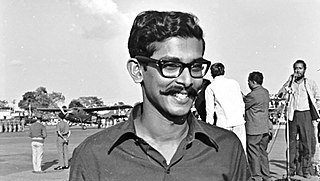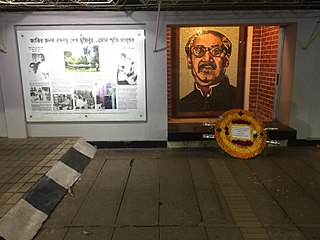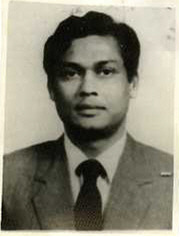
Khondaker Mostaq Ahmad was a Bangladeshi politician. He was the Minister of Commerce in the third Mujib Rahman ministry under Sheikh Mujibur Rahman, and assumed the presidency of Bangladesh after the Assassination of Sheikh Mujibur Rahman on August 15, 1975. He praised the assassins as "sons of the sun" and put cabinet ministers loyal to Sheikh Mujibur Rahman in jail. He was himself deposed by another coup, less than three months later on November 3, 1975.
Lt. Col. Abu Taher BU was a Bangladeshi military officer and war hero. He first served in the Pakistan Army, and later defected to the Bangladesh Army during the Bangladesh Liberation War. He crossed into India around early August and reported to the Indian authorities. After a week screening at Dehradun, India, Taher reported to Kolkata, Bangladesh Provincial government at 8 Theatre Rd. He was ordered to report to Sector 11 of Mukti Bahini under command of Major Ziaur Rahman, he became the sector commander after him. He served in BDF from end of August to 2 November 1971. He was awarded the medal Bir Uttom for his gallantry in the liberation war. He was released from military service by Indian military medical board in Pune, India after his leg was amputated. After independence, he was inducted into the Bangladesh Army for administrative retirement with legacy rank of lieutenant colonel. After settling in with family, the government of Bangladesh appointed him with employment at Kumilla. Later Taher turned into a political activist and leader of the left-wing Jatiyo Samajtantrik Dal.

National Revolution and Solidarity Day is a commemorative and former public holiday celebrated in Bangladesh on November 7. The day pays homage to the Sipahi-Janata revolution in 1975 by regular army soldiers of Dhaka Cantonment and the common masses that showed solidarity with them in support of the deposed government against a military coup. The uprising, though organised by Lt. Col. (retd.) Abu Taher and his clandestine revolutionary socialist group of sepoy mutineers, the Biplobi Shainik Sangstha (BSS), to unsuccessfully create a socialist revolution, resulted in a counter coup. In the backdrop of the 15 August coup against Sheikh Mujib, it ended the four-day long coup d'état to remove from power Mujib's replacement President Khondaker Mostaq and the mid-ranking anti-Mujib army officers backing him, Capt. Abdul Majed, Maj. Syed Faruque Rahman, Maj. Khandaker Abdur Rashid and Maj. Shariful Haque Dalim, organised by the pro-Mujib Brig. Gen. Khaled Mosharraf, who was assassinated in the aftermath. Meanwhile, the soldiers proceeded to release Maj. Gen. Ziaur Rahman, who was put under house arrest at the inception of the coup by Mosharraf.
Syed Faruque Rahman was a coup member involved in toppling the Sheikh Mujib regime in Bangladesh. He was convicted and hanged on 28 January 2010 along with co-conspirators Sultan Shahriar Rashid Khan, A.K.M. Mohiuddin Ahmed, Mohiuddin Ahmed, and Mohammad Bazlul Huda in Dhaka Central Jail, Old Dhaka, for the murder of Sheikh Mujibur Rahman, the founding father and the first president of Bangladesh. Syed Faruque Rahman and his close ally Khondaker Abdur Rashid were the chief organisers of the assassination of Sheikh Mujibur Rahman on 15 August 1975. He was 2IC of the 1st Bengal Lancers Regiment of the Bangladesh Army who led a group of junior army officers in order to overthrew the regime of Sheikh Mujib and install Khondaker Mushtaque Ahmed as president of Bangladesh.

Sheikh Mujibur Rahman, the first president of Bangladesh, was assassinated along with most of his family members during the early hours of 15 August 1975 by a group of Bangladesh Army personnel who invaded his residence as part of a coup d'état. The Minister of Commerce, Khondaker Mostaq Ahmad, immediately took control and proclaimed himself head of an interim government from 15 August to 6 November 1975; he was in turn succeeded by Chief Justice Abu Sayem. The assassination marked the first direct military intervention in Bangladesh's civilian administration. Lawrence Lifschultz characterized this incident as an outcome of the Cold War between the United States-influenced Pakistan and the Soviet Union-influenced India. 15 August is annually observed as National Mourning Day, a commemorative day in Bangladesh.

Sheikh Kamal was the eldest son of Sheikh Mujibur Rahman, former President of Bangladesh and the younger brother of Sheikh Hasina, the former Prime Minister of Bangladesh.
Air Vice Marshal Muhammad Ghulam Tawab was the second chief of the air staff of Bangladesh Air Force who also served as deputy chief martial law administrator of Bangladesh with General Ziaur Rahman and Admiral M. H. Khan from 1975 to 1976.
Jail Killing Day is observed by the Awami League (AL) of Bangladesh and many other political organisations on 3 November every year. It commemorates the killing of four Awami League and national leaders: former vice-president Syed Nazrul Islam, former prime minister Tajuddin Ahmed and Captain (Rtd.) Mansur Ali, and former home minister A H M Quamruzzaman on this date in 1975.
Sheikh Fazlul Haque Moni was a Bangladeshi politician. He was one of the nephews of Sheikh Mujibur Rahman, the founding father of Bangladesh. He was the founder of Mujib Bahini Bangladesh Liberation Force-BLF one of the major guerrilla forces of the Bangladesh Liberation War and also the founder of Bangladesh Awami Jubo League, the youth wing of Bangladesh Awami League.

Begum Sheikh Fazilatunnesa Mujib, commonly known as Begum Mujib; and also known by her nickname Renu, was the wife of Sheikh Mujibur Rahman, the founder and the first President of Bangladesh. She is the mother of Sheikh Hasina, the leader of the Awami League from 2009-2024. She was killed along with her husband, brother-in-law, 3 sons and 2 daughters-in-law.
Gazi Golam Mostafa was a Bangladesh Awami League politician and a former member of the East Pakistan provincial assembly.
Sultan Shahriar Rashid Khan was a Bangladeshi army officer who was convicted for the assassination of Sheikh Mujibur Rahman, the founding father and then President of Bangladesh. On 28 January 2010, Rahman was hanged along with Syed Faruque Rahman, A.K.M. Mohiuddin Ahmed, Mohiuddin Ahmed, and Mohammad Bazlul Huda in Old Dhaka Central Jail.
S.H.M.B Noor Chowdhury is a Bangladesh army officer who was convicted for the assassination of Sheikh Mujibur Rahman, president of Bangladesh, and for involvement in the murder of four national leaders in the Jail Killing. As of 2017, he was a fugitive, residing in Canada. The Canadian government has refused to extradite him, because he faces the death penalty in Bangladesh.
Mohammad Bazlul Huda was a Bangladeshi Army officer and freedom fighter who was convicted of the assassination of Sheikh Mujibur Rahman, founding president of Bangladesh. On 28 January 2010, Bazlul was executed along with Syed Faruque Rahman, Sultan Shahriar Rashid Khan, Mohiuddin Ahmed, and A.K.M. Mohiuddin Ahmed in Old Dhaka Central Jail.

The military coup in Bangladesh on August 15 of 1975 was launched by mid-ranking army officers in order to assassinate founding president Sheikh Mujibur Rahman, whose administration post-independence grew corrupt and authoritarian until he unscrupulously established a one-party state led by the socialist BaKSAL. Mujib, along with his resident family members, was killed during the coup but was survived by his two then-expat daughters, one of them being future prime minister Sheikh Hasina. The officers were led by Capt. Abdul Majed, Maj. Syed Faruque Rahman, Maj. Khandaker Abdur Rashid and Maj. Shariful Haque Dalim.

Ahmed Sharful Hossain, also known as Shariful Islam, is a Bangladesh Army officer and a fugitive involved in the assassination of President Sheikh Mujibur Rahman and the Jail Killing.
The 3 November coup d'état was a military coup in 1975 by Brig. Gen. Khaled Mosharraf against President Khondaker Mostaq Ahmad. It was the result of a power struggle between the regime of Mostaq Ahmad and the mid-ranking officers backing him, Capt. Abdul Majed, Maj. Syed Faruque Rahman, Maj. Khandaker Abdur Rashid and Maj. Shariful Haque Dalim, and Mosharraf and the high-ranking officers supporting him, Col. Shafaat Jamil, Lt. Col. Abu Taher Mohammad Haider and Col. Khondkar Nazmul Huda. The high-ranking officers were worried about army discipline with "junior mutinous officers issuing orders from the presidential palace". With the coup, Mosharraf promoted himself to the rank of major general and the post of Chief of Army Staff after placing Maj. Gen. Ziaur Rahman under house arrest while the mid-ranking officers went on exile, as was agreed upon between the belligerents. The coup lasted 3 days, after which A. S. M. Sayem was installed as president while Mosharraf served as the Chief Martial Law Administrator.
Abdul Majed was a Bangladeshi military officer who was convicted for his role in the assassination of Sheikh Mujibur Rahman, the founding president of Bangladesh.

MoslemuddinKhan, also known as Rafiqul Islam Khan, is a Bangladeshi army officer who was convicted for his role in the 15 August 1975 Bangladeshi coup and the subsequent jail killings. He was sentenced to death in absentia and is currently a fugitive.
The Sayem ministry led what eventually became the first interim government in independent Bangladesh and an unofficial model for future interim regimes. It was formed on 8 November 1975, following the assassination of Brig. Gen. Khaled Mosharraf on 7 November amid a nationwide soldier and public uprising against his 3 November coup d'état. After a three-day coup with support of some high-ranking officers and his Dhaka Brigade, Mosharraf had forced Khondaker Mostaq Ahmad, who, following the 15 August coup that assassinated the autocratic founding president Sheikh Mujibur Rahman, replaced him as President of Bangladesh with support of the mid-ranking assassin officers, to resign. Chief Justice Sayem, with the constitutional requirement for the direct election of the president and role of the vice-president as acting president suspended by Mostaq under a martial law proclamation, had been installed in his place. With Mosharraf's death the responsibility of CMLA fell on Sayem.










